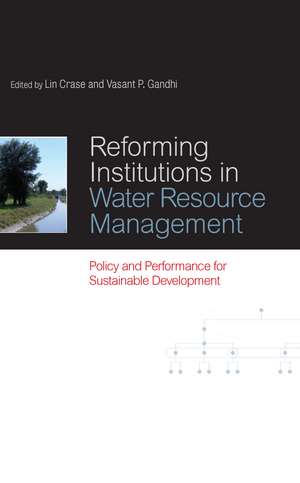Reforming Institutions in Water Resource Management: Policy and Performance for Sustainable Development
Editat de Lin Crase, Vasant P. Gandhien Limba Engleză Hardback – 30 iun 2009
Preț: 573.76 lei
Preț vechi: 766.19 lei
-25% Nou
Puncte Express: 861
Preț estimativ în valută:
109.79€ • 114.92$ • 91.38£
109.79€ • 114.92$ • 91.38£
Comandă specială
Livrare economică 10-24 martie
Doresc să fiu notificat când acest titlu va fi disponibil:
Se trimite...
Preluare comenzi: 021 569.72.76
Specificații
ISBN-13: 9781844077557
ISBN-10: 1844077551
Pagini: 384
Dimensiuni: 156 x 234 x 36 mm
Greutate: 0.7 kg
Ediția:New.
Editura: Taylor & Francis
Colecția Routledge
Locul publicării:Oxford, United Kingdom
ISBN-10: 1844077551
Pagini: 384
Dimensiuni: 156 x 234 x 36 mm
Greutate: 0.7 kg
Ediția:New.
Editura: Taylor & Francis
Colecția Routledge
Locul publicării:Oxford, United Kingdom
Cuprins
1. The Effectiveness of Water Institutions.2. Laws, Customs and Rules: Identifying the Characteristics of Successful Water Institutions.3. Dynamic Community Preferences: Lessons for Institutional Design and Measuring Transaction and Transformation Costs.4. Institutional Constraints and Organisational Dynamics: The Case of Water Trade between the Australian Capital Territory and New South Wales.5. Institutions for Water Management in Developing Countries: Their Role, Nature and Analysis.6. Water Institutions in India: An Institutional Design Perspective.7. Legal Dimensions of Water Resource Management in India: A Review of Legal Instruments Controlling Extractions to Sustainable Limits.8. Water Resource Development and Institutions in India: Overview and Profile.9. Water Institutions in the States of Andhra Pradesh, Gujarat and Maharashtra in India: An Empirical Study.10. Surface Water Institutions in India: An Empirical Study.11. Ground Water Institutions in India: An Empirical Study.12. Rain Water Harvesting Institutions in India: An Empirical Study.13. Rights Devolution Under Irrigation Management Transfer in Developing Asia: Theoretical Considerations and Empirical Results.14. The Role of Information and Decision Making Capacity in a Hierarchal Process.15. Water Institutions and their Relationship to Poverty Alleviation.16. Institutions and Irrigation in India - Concluding Lessons and the Way Forward.Index
Notă biografică
Lin Crase is Executive Director of the Albury-Wodonga Campus at La Trobe University, and has published widely on water policy. Vasant Gandhi is Professor at the Centre for Management in Agriculture at the Indian Institute of Management, Ahmedabad, and has published extensively on policies and institutions for food and agriculture.
Recenzii
'This is an authoritative volume on water institutions and institutional reforms in India. What makes this as a unique piece of work is its attempt to effectively link the theory with the empirics of institutional analysis. It is certainly a very valuable addition to the literature on water institutional reforms.'Rathinasamy Maria Saleth, Director, Madras Institute of Development Studies, India'This book provides new approaches for design and analysis of institutions and their performance in the water sector. It is a must read to both those who believe in and those who are sceptical about the role of non-structural policies in the water sector.'Ariel Dinar, Professor of Environmental Economics and Management, and Director of the Water Science and Policy Center, Department of Environmental Sciences, University of California, USA
